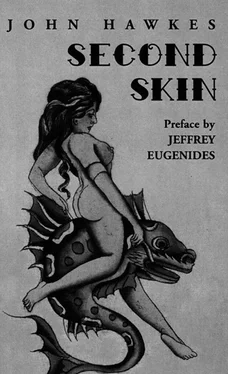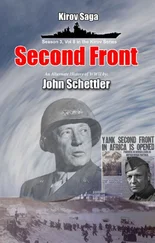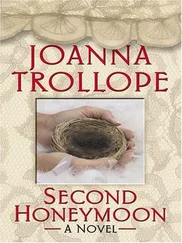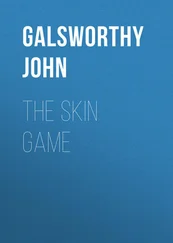“The Horst Wessel ,” she said above the din of the conquering music. “Don sent me the record.” And then listening, abstracted in the pleasure of the loud marching song, slowly and with level eyes still on mine, she reached out one white hand, seized the full glass of whiskey, raised it in a salute in my direction: “Old Grand-Dad. Bottle’s in the kitchen. Help yourself.”
She was waiting, watching me, and now I was bracing myself against the doorjamb, leaning against it, sagging against it, stood there with one wet shoe tapping time to the march. “Thanks. But I don’t drink.”
“Oh. You don’t drink. Well then, you can light the fire.” And she tossed the box of matches at my feet, put the glass to her mouth — thick glass, white teeth, burnished whiskey — began to pull at it like a man, and her neck was bare, bold, athletic, and her rump was a yellow rock in the saddle of her calves, and under the white shirt her breasts were crowned with golden crowns. I thought of poor Sonny and his rum and Coca-Cola, I thought of poor Gertrude stealing frantic sips of gin out of her cheap little cream cheese glasses, I thought of poor Pixie’s milk curdling in the kitchen sink. But Don’s widow was sitting on her heels and drinking, and all the young German men were singing for her, marching for her. I failed to see the spinning wheel and bumped it, that construction of brittle cobwebs five feet high, and thought it was going over. Then I stooped down quickly and stuffed a few leaves of newspaper between the logs and struck a flame.
Iron pot on a hook, iron spit for the impaling and roasting of some headless blue turkey, a little straw broom and dusty heart-shaped bellows, and on the andirons great solid brass balls fit for the gods. Suddenly the tall swallow-tailed flames and crackling puffs of orange and deep green light between the logs threw all these hand-forged or handmade engines into relief, set them in motion, brought them to life, and I smelled the damp bursts of smoke and the widow was warming herself at the witches’ fire. Beside the bellows was a coffin-shaped legless duck — faded decoy carved with a knife — that stared me down with two tiny bright sightless chips of glass. Fire in the antique shop. Dead duck. Smoke in my eyes.
“Take off your shoes, for God’s sake,” she said, and the mellow voice was loud above the chant of the SS men, the firelight landed in yellow lozenges on the slopes and in the hollows of her slacks, “you must be frozen. But go ahead, warm your toes while I tell you about Don.”
And I could only nod, tug at the wet laces, free my heels, roll down the socks, wring them out — drops of steam on the hearth — could only make room for her and sit beside her on the cold wide naked planks of that floor with my hands propped behind me and my white feet and hers thrust into the heat. She dropped down on an elbow, crossed her long straight legs at the ankles, held out the whiskey glass — but it was not for me, that whiskey, at least not then — and breathing deeply, straining at the nostrils, shirt binding and slackening across her breasts, she began to wheeze. To wheeze! The big white knuckles of the fingers holding the glass, her crowned breasts, the mighty head of black hair, the stomach girding her in front like the flexible shape of a shield, the fluted weight of neck and arms and legs, all the impressive anatomy of this Cleopatra who could row her own barge, this woman who could outrun horses on the beach or knock down pillars of salt, everything about her revealed perfect health, denied this sudden swirling of mud or rattling of little pits in her chest. But even above the raucous melody of the eager Germans and their impossible military band I heard it: the sound of obstructed breathing, tight low crippling whine in the chest. Yet her eyes on mine were direct and heavy and dark, were large and black and fierce and cracked by spears of silver light. She wheezed on, mocked by the competitive fire, waiting for the steel needle to descend once more into the grooves of plodding Reichstag hysteria, and then whacked herself once on the uppermost yellow thigh and began to talk.
“That’s him in the picture,” she said without moving, without pointing, merely assuming that I had seen it when I entered the room. I nodded. “That’s Don. Young, good-looking boy. He stepped on a land mine, God damn him. In Germany. He took a wrong step and then no more Don. Poof. I met him in South Carolina. There he was, toward sundown standing at a country bus stop in South Carolina. The end of nowhere and burning up at the edges. Nothing but the road, a tree smothered with dust, the little three-sided shed where they were supposed to wait for the bus, a field full of scarecrows. And in front of the shed and surrounded by perhaps twenty cotton pickers, there was Don. I saw him. Short, limber, smile all over his face, head of tight blond curls, overseas cap like a little tan tent on the side of his head. Bunch of tattered damn black cotton pickers out for blood and this wonderful bright little guy with his smile and curly hair. Don. A little angel in South Carolina. So I gave him a lift. Sense of humor? My God, he had a sense of humor.” And suddenly she was choking on a snort of laughter, choking, gasping, giving my now toasty bare foot a friendly push with hers. And now her wheezing had found another depth, and each word came out shrouded in its cocoon of gravelly sound, its spasm of spent breath, and there were streaks of moisture at the hairline and on her upper lip. She took another slow drink of whiskey and the silver strand of hair hung down, the voice was deep.
She set down the glass and filled her lungs and said: “Good God, I married him for his humor. Because he was light on his feet and light in his heart. And because he was quick and talented and because he was just a boy, that’s why I married him. Why I gave him a lift and followed him to Galveston, Texas, and married him. Don. Three dozen roses, a brand new hot plate, a rented room outside Galveston, and one day Don telling me he had been elected company mascot — what a sense of humor, what a winsome smile — and that night our celebration with a spaghetti dinner and bottle of dago red. I should have known then that it couldn’t last. My God. …”
The golden foot was struggling against mine, the perspiration was as thick as rain on her lip, her shirt was wet and through it I could see the sloping shoulder, the handsome network of blue veins, the companion to the black brassiere that was still hanging in the john upstairs. Stretched full-length at my side she was wheezing and staring into the light of the fire, and now there were dimples, puckers, unsuspected curves in the canary yellow slacks, and now her chest was maniacal, was as trenchant and guttural and insistent as the upturned German record itself. So I looked at her then, forced myself to return the stare of those vast dark eyes, and she tried to shrug, tried to toss back the thick length of silver hair, but only glowered at me out of her stricken heaviness and abruptly tapped herself on the chest.
“Asthma.” Tapping the finger, squaring the jaw, watching me. “I get it from too much thinking about Don. But it’s nothing. Nothing at all. …”
I nodded. And yet the fire had fallen in and the pot and spit were glowing and her knee was lifting. Her lips were moist, pulled back, drawn open fiercely in the perfect silent square of the tragic muse, and I leaned closer to smell the alcohol and Parisian scent, closer to inspect the agony of the muscles which, no thicker than hairs, flexed and flickered in those unhappy lips, closer to hear whatever moaning she might have made above the racket of her strangulation.
“What can I do? Isn’t there something I can do?”
“The secretary,” she said. “Bring me the box in the middle drawer. Saucer too. From the kitchen.”
Читать дальше












